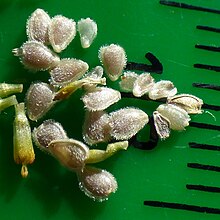Bellis sylvestris
| Bellis sylvestris | |
|---|---|

| |
| Scientific classification | |
| Kingdom: | Plantae |
| Clade: | Tracheophytes |
| Clade: | Angiosperms |
| Clade: | Eudicots |
| Clade: | Asterids |
| Order: | Asterales |
| Family: | Asteraceae |
| Genus: | Bellis |
| Species: | B. sylvestris
|
| Binomial name | |
| Bellis sylvestris | |
| Synonyms[1] | |
| |







Bellis sylvestris, the southern daisy, is a species of the genus Bellis. It is a perennial plant native to central and southern Europe, the Middle East, and north Africa, and grows up to fifteen centimetres (six inches) tall. The name sylvestris comes from the word silvestris meaning "living in the woods" in Latin.
Characteristics
[edit]The southern daisy's creeping roots are rhizomes. what we usually call flower is an inflorescence composed of tens or hundreds of minuscule flowers. Those on the outside are white with a ligule. Those on the inside are yellow tube-shaped. The plant bears fruits called achenes.[2]
B. sylvestris is morphologically similar to Bellis pappulosa but has no scales on the pappus of the seeds, unlike B. pappulosa.[3] Moreover, B. pappulosa is diploid while B. sylvestris is polyploid.[4]
References
[edit]- ^ "Bellis sylvestris Cirillo". Plants of the World Online. Board of Trustees of the Royal Botanic Gardens, Kew. Retrieved 5 November 2021.
- ^ "Bellis sylvestris (Southern daisy)". 19 January 2019.
- ^ Calvo, J.; Quintanar, A.; Aedo, C. (2012). "Typification of four species names of Bellis (Compositae)". Nordic Journal of Botany. 30: 668–670. doi:10.1111/j.1756-1051.2012.01373.x.
- ^ Fiz, O.; Valcárcel, V.; Vargas, P. (2002). "Phylogenetic position of Mediterranean Astereae and character evolution of daisies (Bellis, Asteraceae) inferred from nrDNA ITS sequences". Molecular Phylogenetics and Evolution. 25: 157–171. doi:10.1016/S1055-7903(02)00228-2.
